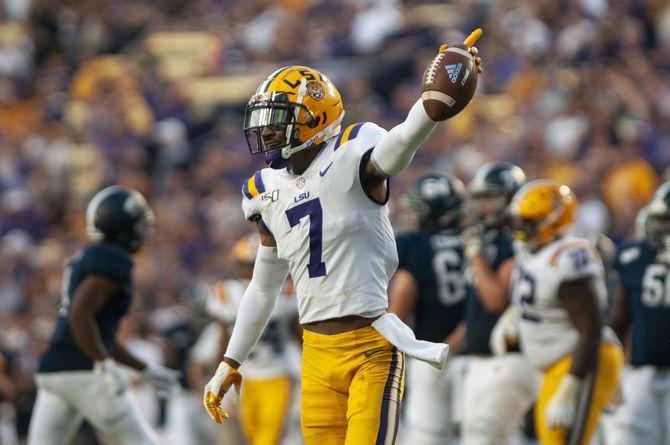NASHVILLE, TN – LSU’s 66-38 win over Vanderbilt may be the ultimate display and contrast of the new LSU Tigers compared to the teams before them.
The score entering the fourth quarter was 10-3 the last time LSU played Vanderbilt in 2010. LSU scored 17 points in the fourth and won 27-3 in a fairly traditional, uninspiring performance under former coach Les Miles.
Nine years ago, LSU’s standout player offensively was running back Stevan Ridley. Ridley carried the ball 17 times for 159 yards and a touchdown while Russell Sheppard and Alfred Blue each chipped in touchdowns.
Quarterback Jordan Jefferson finished the game 8-of-20 passing for 96 yards with an interception.
The star power resided on LSU’s defense. The Tigers were built on the backs of Patrick Peterson, Kelvin Sheppard, Drake Nevis and Tyrann Mathieu along with a host of other future NFL players.
The score entering the fourth quarter on Saturday: 59-31.
The 77-point differential between the scores indicates not only how college football has evolved and how LSU’s offense finally caught up to evolution, but also highlights the momentary struggles of LSU’s defenses.
LSU’s star power currently resides on offense, led by senior quarterback Joe Burrow and an explosive group of wide receivers. Yes, there’s still studs in LSU’s secondary like senior cornerback Kristian Fulton, junior safety Grant Delpit and freshman cornerback Derek Stingley, but the defense overall has looked subpar in the last three games.
Vanderbilt running back Ke’Shawn Vaughn rushed for 41 yards on the first play Saturday. The Commodores were able to turn it into a touchdown, taking a 7-0 lead out the gate. Vaughn continued to gash LSU throughout the game, rushing for 130 yards and two touchdowns on 20 carries.
There’s a variety of reasons for why LSU’s defense is struggling in random moments. Start with an offense that has scored under three minutes on extended drives 24 times this season and continuously play at an up-tempo pace.
The more LSU scores and the more time the offense leaves on the clock, the more possessions that are in the game. It’s a basic logical equation.
“People have to get used to LSU scoring so fast,” said junior safety JaCoby Stevens. “Like coach O always says, ‘it’s basketball on turf,’ so it basically turns into a possession game…”
“It’s about stopping the opposing offense for this possession and giving our offense an extra possession,” Stevens said. “We’re obviously going to score 50-something again and they’re going to score quick, which is going to put us on field.”
LSU only won the time of possession battle once in four games this season, losing it on average by over seven minutes.
It’s why a defense that forced seven three outs and had two interceptions along with a fourth down stop gave up 24 points, excluding the two offensive turnovers that were returned for touchdowns.
Then there’s missed tackles, bad defense on third down and a struggle to generate a consistent pass rush as junior safety Grant Delpit put it. He attributed the missed tackles to
overthinking and still feels LSU’s in a good spot defensively.
Follow that up with a variety of injuries in LSU’s front seven and inexperience, and the sum is what LSU coach Ed Orgeron attributed the greatest problem to.
Gap integrity and staying in your assignment.
“If you stay in your gap has nothing to do about being tired or being disciplined,” Orgeron said. “Tackling has nothing to do about being tired. There was nobody that was being tired or being gassed out there.”
“I thought it was a nice cool day, we practiced a lot hotter day,” Orgeron said. “Guys are in good shape. So there’s no thinking that the offense is going fast or we’re being tired, there’s none of that. There’s no excuse for that in the world.”
LSU defense feeling the effects of new offensive philosophy, Orgeron says ‘there’s no excuse’
By Brandon Adam
September 21, 2019
LSU junior safety Grant Delpit (7) celebrates after recovering a fumble during the Tigers’ 55-3 victory over Georgia Southern on Saturday, Aug. 31, 2019, at Tiger Stadium.
More to Discover








